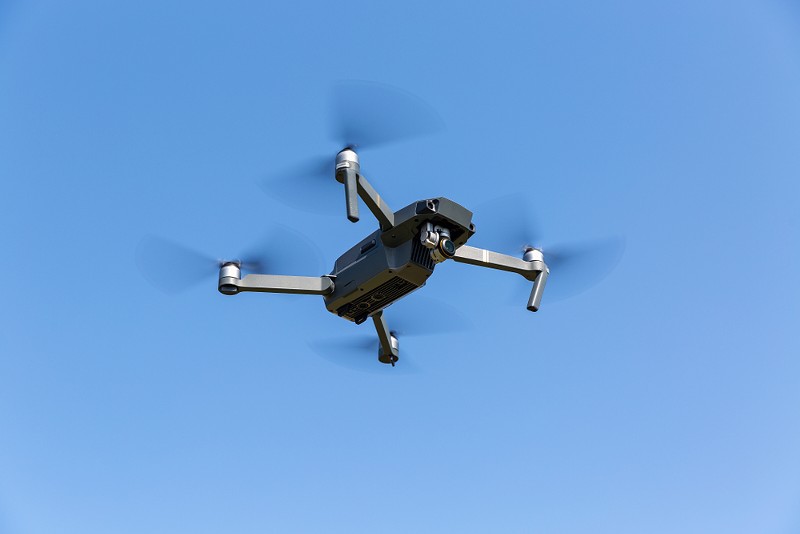Michigan homeowner Todd Maxon had questions when he noticed a drone hovering above his property on May 5, 2018. So he followed the aircraft to a nearby baseball field and found its owner.
The man working the controls refused to show his operator’s license, but Maxon learned what was going on when his local government sued him for alleged zoning violations. Officials in Long Lake Township, Michigan, had hired a drone company to surveil Maxon’s five-acre lot without his knowledge or consent.
The intrusion was part of a prolonged search involving three covert missions over a span of several months, starting in 2017. No part of Maxon’s property was off limits. Flying as low as the treetops, the drone photographed Maxon’s driveway, garage, backyard, and surrounding areas.
If anyone had been sunbathing, the drone would have captured that too. But the focus of the search was something else. Maxon fixes automobiles as a hobby, and zoning officials have tried for years to tag him as a nuisance. They thought they had him in 2007, when they accused him of running an illegal salvage yard. But their case fizzled, and the township paid Maxon’s attorneys’ fees.
What followed was a 15-year grudge. Unable to let go, the zoning police monitored Maxon’s property, waiting for any opportunity to pin some violation on his home. Trees and buildings obstructed their view, so they hatched the plan to watch from the sky.
The problem is they never obtained a warrant.
In their zeal to punish a backyard tinkerer, they trampled on the Fourth Amendment, which guarantees “the right of the people to be secure in their persons, houses, papers, and effects, against unreasonable searches and seizures.”
Maxon responded with a motion to suppress the drone footage. His case is strong. The warrantless snooping was intentional, repeated, and invasive — three strikes against the township. But the Michigan Court of Appeals set aside these concerns in 2022, holding in a 2-1 decision that zoning officials can violate the Fourth Amendment and still use the evidence they collect for civil enforcement. Under this interpretation of the Constitution, citizens are only secure from government overreach in criminal matters.
If the ruling stands, overzealous code enforcers could target any Michigan home for intrusive surveillance without probable cause or judicial signoff.
Maxon has a chance to restore balance at the Michigan Supreme Court, which has agreed to hear his case. Our public interest law firm, the Institute for Justice, represents him as part of our commitment to protecting Fourth Amendment rights.
The challenge increases as technology advances, creating new opportunities for the government to pry. Zoning officials in Humboldt County, California, have used satellite images from space to issue civil citations without ever making on-site inspections. Agencies elsewhere have used airplanes flying at 1,000 feet and helicopters flying at 400 feet to collect evidence. Now drones are hovering below 200 feet.
Height is only one issue. Drones not only fly lower than traditional aircraft, but quieter and stealthier. And they can carry advanced technology like infrared cameras, heat sensors, motion detectors, and automated license plate readers. Whether using this technology for surveillance of homes requires a warrant remains up in the air, and the Michigan Supreme Court’s decision will set the early standard nationwide.
The U.S. Supreme Court has also weighed in, setting boundaries in 2001 after federal agents pointed a thermal-imaging device at a suspected drug house in Oregon. But that case was a criminal matter. If courts carve out an exception for civil investigations, code enforcers could flaunt the Constitution’s protections.
Game and fish wardens already show what can happen. Many states allow these officers to conduct warrantless searches on private land away from the “curtilage,” the area immediately surrounding a dwelling. Using this Fourth Amendment loophole, wardens have snuck past “no trespassing” signs and hidden spy cameras in the trees. The Institute for Justice has challenged this practice in Pennsylvania and Tennessee.
Drone technology could allow further intrusions into the places where people live and work. If code enforcers got caught, they would have a ready excuse. “Don’t worry,” they could say. “We’re just looking for civil violations.”
This would hardly be reassuring. The Fourth Amendment demands better.
Michael Greenberg is an attorney and Daryl James is a writer at the Institute for Justice in Arlington, Virginia.
Subscribe to Metro Times newsletters.
Follow us: Google News | NewsBreak | Reddit | Instagram | Facebook | Twitter







